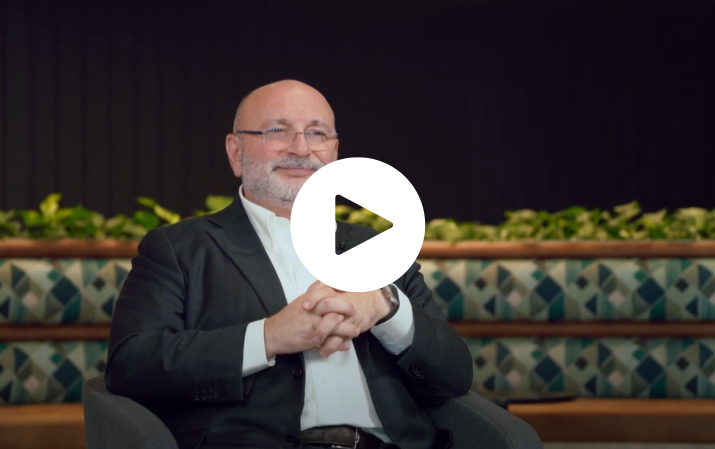25 July 2024
Welcome to this edition of Practice Connect, a fortnightly update for practice managers, nurses and practice administration staff on relevant issues, upcoming events and education.
Acknowledgement of Country
WA Primary Health Alliance acknowledges and pays respect to the Traditional Owners and Elders of this country and recognises the significant importance of their cultural heritage, values and beliefs and how these contribute to the positive health and wellbeing of the whole community.
Throughout this newsletter, the term ‘Aboriginal’ is used to refer to Aboriginal and/or Torres Strait Islander people, unless stated otherwise.

Celebrating 200 editions of Practice Connect
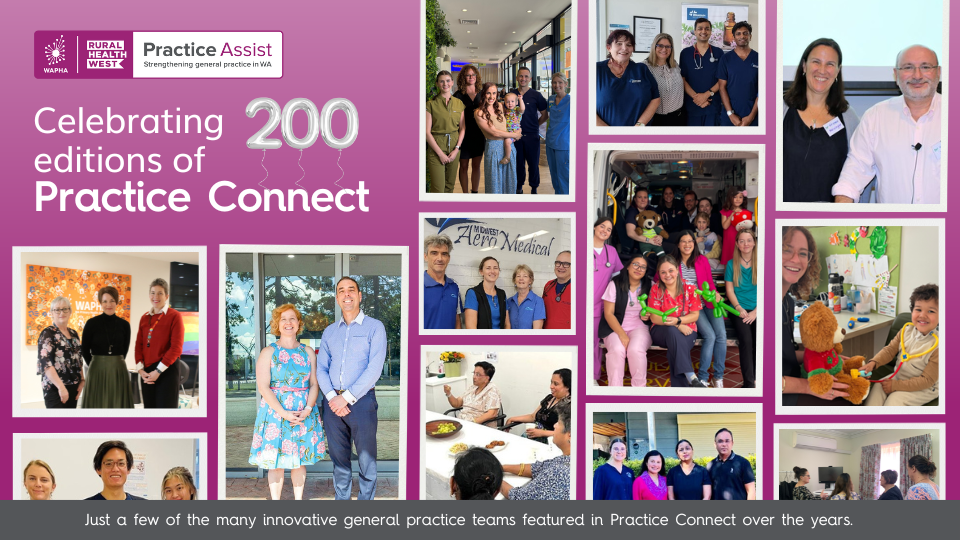
Today we are thrilled to be celebrating 200 editions of our highly valued Practice Connect newsletter, connecting general practice staff to the latest industry news, events and resources, every fortnight for over six years!
Practice Connect was first published in 2018 as part of Practice Assist, our joint initiative with Rural Health West to provide an integrated support service to general practices across Western Australia.
Over the years, Practice Connect has built a reputation for delivering a high-quality and reliable fortnightly update to general practices, with our audience base growing significantly to 2,713 subscribers across WA and even throughout Australia.
WA Primary Health Alliance (WAPHA) Executive General Manager Bernadette Kenny says Practice Connect is dedicated to strengthening general practices through providing practice teams with the information and resources they need in the evolving primary care landscape.
“So much work goes into each edition of Practice Connect to ensure it is of high value and addressing the current issues, as they happen.
“The Practice Connect team is embedded within Practice Assist, so a great deal of the content is in direct response to what our Primary Care Navigators are hearing on the ground from local practices.
I am so proud to see the 200th edition go out today to more than 2700 readers.”
Practice Connect has tackled a broad range of issues facing general practice, the most read topics and most downloaded resources over the last 12 months including:
- MyMedicare practice and patient registration
- Medicare Benefits Schedule updates
- Strengthening Medicare General Practice Grants Program
- Respiratory syncytial virus (RSV) and influenza vaccination
- Free WA influenza vaccination program
- Practice Assist Immunisation Tool Kit
- Practice Assist Year Planner
Of course, each edition would not be complete without a Good News Story highlighting the innovation and dedication of hardworking general practice teams across WA. To celebrate edition 200, Practice Connect Editor (and WAPHA Primary Care Navigator), Fiona Tillotson has selected some of the most read stories:
- Enhancing multidisciplinary care for CHF patients with non-dispensing pharmacists
- Leveraging the Primary Sense data tool for improved patient care
- Grove Medical boosting infant RSV immunisation in their community
- Collaboration key to supporting patients with endometriosis and pelvic pain
- Lockridge Medical Centre celebrates NAIDOC Week
- General practices collaborate and educate vulnerable and CALD patients
- Garden Family Medical Clinic hosts a Teddy Bear Hospital
- WAPHA staff visit general practices across the Goldfields
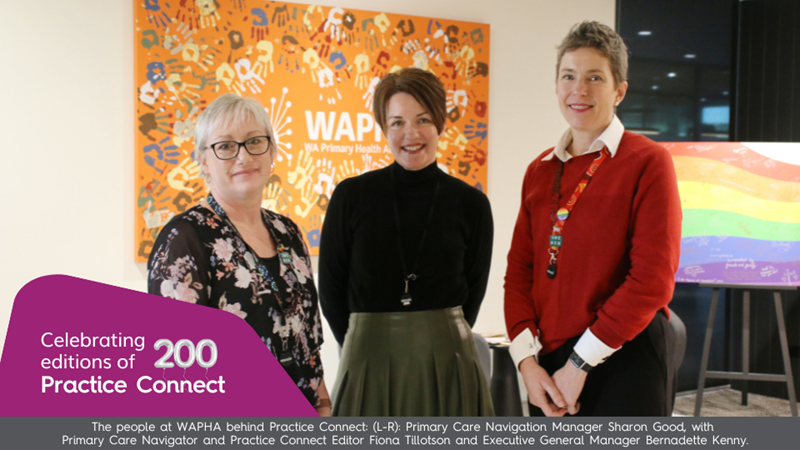
Thank you to all our readers for helping us reach this milestone of 200 editions. We value your ongoing support and welcome your questions and feedback, which can be provided by emailing practiceassist@wapha.org.au or calling 1800 2 ASSIST (1800 2 277 478 or 08 6278 7900).
If you haven’t done so already, please take a moment to subscribe to Practice Connect to receive our fortnightly newsletter straight to your inbox every fortnight.

General Practice in Aged Care Incentive – accreditation and exemptions for non-traditional practices
Some general practitioners that deliver care to residential aged care homes operate as sole providers and mobile practices and until recently were not eligible for accreditation under the RACGP accreditation standards.
Following consultation, the definition of a general practice has been expanded by RACGP, providing an opportunity for more practices to benefit from enhanced quality and safety and practice incentive payments.
The RACGP Interpretative guide for non-traditional general practices for the purposes of accreditation provides general practices and accreditation assessors information to understand how the RACGP 5th Edition standards apply to general practices previously not eligible for accreditation. The interpretive guide outlines how indicators in the standards may apply differently or may not be relevant to non-traditional practices and those without a physical clinic premises.
Whilst MyMedicare, and the General Practice in Aged Care Incentive require a practice to be accredited, an exemption is in place until 30 June 2025.
This will enable ‘non-traditional practices’ such as mobile general practitioners providing essential visiting services to Residential Aged Care Homes to participate in MyMedicare, and the General Practice in Aged Care Incentive.
Follow the links below to:
- Register your organisation with Services Australia, and
- Register for the General Practice in Aged Care Incentive.
Non-traditional practices do not need to indicate their intention to become accredited to register and participate during the exemption period.
WAPHA will provide updates about the accreditation pathway and process for non-traditional practices as more information is made available by accreditation agencies.
Signing up your residential aged care patients to MyMedicare
If your practice is planning to participate in the General Practice in Aged Care Incentive, you may be considering the practicalities of how to sign up your patients living in an aged care home for MyMedicare.
There are several approaches to how your practice can do this and we’ve provided a few options for you to consider and adapt to suit your practice setting below. Of course, you’ll need to make sure your practice is signed up to MyMedicare beforehand. Services Australia has some handy resources about how to sign up your practice.
Option 1 – Practice initiated online registration
This option allows your practice to start patient registration for MyMedicare through HPOS, which then can be finalised by a patient (or an appropriate carer or family member) through their Medicare Online Account or Express Plus Medicare Mobile app.
This option will only work for your patients who have a Medicare Online Account setup to receive digital notifications. If they don’t have an online account, you will receive an error message in HPOS. If this occurs you may wish to contact them to encourage them to setup an online account, or use the approach outlined in option 2 or 3.
- Step 1 – Start the registration process for MyMedicare via HPOS through the ‘My Programs’ tab by selecting the MyMedicare tile.
- Step 2 – search for a known patient and start their registration with your practice. This will send the patient (or their carer or family member) a notification in their Medicare Online Account or Express Plus Medicare Mobile app.
- Step 3 – the patient (or their carer or family) uses their online account or app to finalise their MyMedicare Registration with your practice.
- Details of how to complete these steps are available through the Services Australia e-learning package – Managing patient registrations (see pages 15 – 18).
Option 2 – Practice initiated registration forms
This option allows your practice to partially complete a MyMedicare registration form with patient details from your practice software for patients, carers or guardians to sign to consent to MyMedicare registration with your practice.
Most general practice software has a function that will pre-complete a MyMedicare registration template for individual patients. You can use this functionality to complete a form for each residential aged care patient, print and have patients or their guardian sign them. You may wish to mail the forms directly to the patient, guardian or residential aged care home to complete, or take them with you on your next residential aged care visit.
Alternatively, if you need to pre-complete a large number of patient registrations, you may consider the below mail merge process to save you time. Here are some suggested instructions, which contain a mail merge MyMedicare Registration Form and example cover letter for residential aged care homes you can modify to suit your practice.
Option 3 – Patient self-registration
Patients can register themselves, or their family or carer can also support them in completing a MyMedicare registration form or registering online through Medicare Online Account or the Express Plus Medicare Mobile app.
- Step 1 – develop a list of your Residential Aged Care Home patients using your clinical software. You may already have a list, or you can search your practice software for addresses of Residential Aged Care Homes you deliver care to, or for MBS items that are exclusive to Residential Aged Care homes (e.g. 90020, 90035, 90043).
- Step 2 – decide on how you wish to communicate to encourage patients to register. Ideas could include:
- An SMS, email or letter to the patient or their guardian.
- Engaging with Residential Aged Care Homes to see if they are happy to pass on information to encourage patients and their guardians to register.
- Making time to discuss MyMedicare registration with patients and their guardians next time you visit the residential aged care home, and providing a brochure or information to help them complete their registration.
- Step 3 – you may need to accept the registration in HPOS. See Managing patient registrations (see pages 5 – 14).
Once your patients are registered, you can add them to the General Practice in Aged Care Incentive patient incentive indicator (see page 27 of Managing patient registrations).
Patient information about MyMedicare
To inform patients and their carers about MyMedicare the resources below can help explain the benefits and what it means for them.
Patient Brochures
Multidisciplinary team care and Strengthening Medicare reforms
Preparing for the Medicare reforms: Insights from Dr. Walid Jammal
In preparation for MyMedicare, it’s important for practices to come together as a team to understanding why it is important for them and their patients.
In a recent interview, Dr Walid Jammal from Hills Family General Practice commented that every practice will have its own response to the reform, but by focusing on patients, practices can prepare for the changes to come.
“We’re moving towards a cohort driven, patient centred model of care that involves in-reach and outreach to our patients and is funded by a blended funding model.”
Watch moreas Dr Jammal shares his insights into what practices should be doing to prepare for the Medicare reform.
Strengthening Medicare GP Grants Closure Activities
The Strengthening Medicare GP Grants program has now come to an end.
Practices who have not yet completed the financial acquittal and self-evaluation survey forms are required to complete these forms no later than Wednesday 31 July 2024.
The links to the forms can be found below:
If there are any concerns with grant expenditure at this time, please email gpgrants@wapha.org.au as soon as possible to discuss.
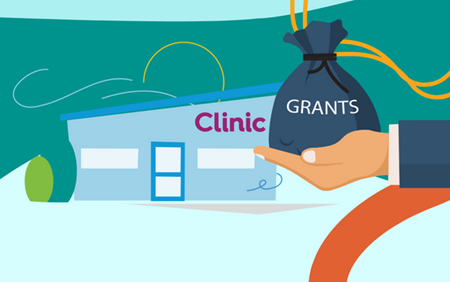
Nominations Now Open! 2025 WA Rural Health Excellence Awards

NOMINATIONS NOW OPEN!
Rural Health West is excited to announce that nominations are now open for the 2025 WA Rural Health Excellence Awards!
These prestigious awards recognise and celebrate health professionals who have dedicated their careers to providing exceptional care in rural communities across Western Australia.
They invite you to nominate a colleague who has made significant contribution to rural health, or encourage your patients to nominate you if they believe your work has made a difference in their lives. This is a wonderful opportunity to shine a spotlight on the hard work and commitment of rural health professionals.
Award Categories:
- Aboriginal Health Professional of the Year
- Allied Health Professional of the Year
- Clinical Leader of the Year
- Community Health Professional of the Year
- General Practitioner (GP) of the Year
- Health Team of the Year
- Nurse or Midwife of the Year
- Specialist (Non- GP) of the Year
- Young Professional of the Year
The Awards acknowledge the dedication of health professionals who have enhanced the range and quality of medical care available in rural Western Australia. Whether it’s through exceptional patient care or leadership in clinical practice, we want to celebrate those who make a difference.
To learn more about each award category and the nomination criteria, please visit the 2025 WA Rural Health Excellence Awards website.
Rural Health West looks forward to receiving your nominations and celebrating the outstanding contributions of rural health professionals in WA.
Nominations close 4 September 2024.

Experts urge maternal vaccination
As pertussis notifications rise, experts are urging the community to be up to date with their vaccinations, in particular those planning a pregnancy or currently pregnant.
After decreasing from an average 12,280 per year in 2017–2019 to 3,457 in 2020 and just 550 in 2021, pertussis notifications in Australia have surged of late.
Over 13,000 notifications have been recorded across Australia this year, with the highest numbers seen in Queensland and New South Wales.
Western Australia has 229 cases notified thus far in 2024.
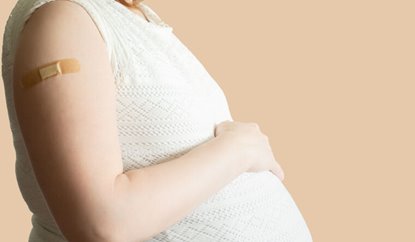
Webinar: Immunisation in Pregnancy and Other Adults
Presented by WA Primary Health Alliance
29 August 2024 (5pm to 6pm AWST)
Join WA Primary Health Alliance for the upcoming webinar focusing on vaccination in Pregnancy and Other Adults on 29 August 2024.
For more information and register, click here.
Eligibility expansion for Mpox vaccination program
Eligibility for the WA government-funded mpox vaccine has been expanded to include people living with HIV, if at risk of Mpox exposure, as well as their sexual partners, to reflect the Australian Immunisation Handbook recommendations.
For a complete list of all eligible persons and where to get the Mpox vaccine, please see Mpox (monkeypox) (health.wa.gov.au).
Matter of Vax
Immunisation Foundation of Australia has recently launched another season of their popular “Matter of Vax” podcasts.
This season, they are taking a deep dive into the science behind a variety of vaccine-preventable diseases, including RSV, Pertussis, Pregnancy Vaccines, Travel Vaccines, and Hepatitis.
As part of this series, there are 5 new short videos available on our website, which can be shared and/or downloaded for use in clinics or on social media.
Head to the website for more information https://www.ifa.org.au/matterofvax
Start the Shingrix conversation and shield your patients from shingles today
The shingles vaccine Shingrix replaced Zostavax on the National Immunisation Program (NIP) on 1 November 2023.
A two-dose course of Shingrix is available for free for eligible people most at risk of complications from shingles.
These groups are:
- Aboriginal and Torres Strait Islander people aged 50 and over.
- People aged 65 and over, and
- Immunocompromised people aged 18 and over with certain medical conditions.
There are a range of resources to help you start the conversation.
Your recommendations and advice play a very important role in a patient’s decision about vaccination.
Available resources:
Rabies, travel vaccines and global trends in vaccine-preventable diseases – webinar
Presented by National Centre for Immunisation Research and Surveillance
8 August 2024 (12:00pm to 1:30pm AEST)
Join National Centre for Immunisation Research and Surveillance (NCIRS) for their upcoming webinar on rabies and vaccines to have before travelling.
Hear more about which vaccine-preventable diseases are emerging globally – and how – and the implications for travellers.
The panel of international and local experts will present on topics of current relevance to immunisation and health professionals including:
- recent changes to rabies vaccination recommendations in Australia
- rabies outbreaks and prevention in our region
- global trends in vaccine-preventable vector-borne diseases and what they mean for travellers
- practical tips for successful travel vaccination consults.
More information, including short biographies of the presenters, can be found on the event webpage.
This event will be recorded and made available on the NCIRS website in the days following the webinar.
Register now to receive the link to the recording via email when it becomes available.
Protecting Children and Older Adults from Infectious Pneumococcal Disease – webinar
Presented by Immunisation Coalition
Wednesday 27 August 2024 (4.30 to 5.30pm AWST)
This event aims to highlight advancements in diagnosis, treatment and prevention of pneumococcal disease.
The Immunisation Coalition expert panel will discuss pneumococcal disease, vaccine development, and the impact of vaccines on disease reduction in both adults and children.
They will also discuss the different serotypes and their effects across age groups, provided insights into invasive pneumococcal disease, immunisation recommendations, and compare polysaccharide and conjugated vaccine types.
The panel will review valent options and the future pneumococcal immunisation program for reducing disease burden.
Additionally, strategies to increase immunisation rates among older adults and high-risk groups will also be covered.
To register for this activity, simply:
- Download the CPD HCP app on your phone or tablet or use the website at https://www.cpdhcp.com.au
- Click on Create an Account or login with your existing account if you have used this website or app previously.
Click on the arrow next to the event and click on register.

National Lung Cancer Screening Program (NLCSP) implementation update
The Department of Health and Aged Care recently launched the NLCSP public website, available at: health.gov.au/nlcsp.
The website provides key NLCSP updates, including the work of the organisations assisting with designing and developing the program.
Key partnerships are held with:
- the National Aboriginal Community Controlled Health Organisation (NACCHO) to co-design the program with and for First Nations people, ensuring it is culturally safe
- Heart of Australia to provide mobile lung cancer screening in rural and remote areas
- Lung Foundation Australia to support at risk groups to use the program
- the Daffodil Centre to develop resources to support consumers and healthcare professionals
- the University of Melbourne to develop the program guidelines and informed consent guides to support healthcare professionals along the screening pathway
- the Royal Australian and New Zealand College of Radiologists to prepare the radiology sector, including through sector specific structured reporting and education and information materials
- Telstra Health to expand the National Cancer Screening Register to include the NLCSP.

Get the Facts: Supporting self-collect cervical screening in your community
The National Aboriginal Community Controlled Health Organisation (NACCHO) will be hosting 2 one-hour webinars for staff from ACCHOs and AMS’ on the cervical screening self-collection option for Aboriginal and/or Torres Strait Islander women and people with a cervix.
Offering these patients the option to collect their own test provides greater choice and empowerment in screening and discussing screening in a culturally sensitive manner can overcome barriers to participation.
Come along to learn more about how we can increase cervical screening awareness and participation amongst Aboriginal and/or Torres Strait Islander women and people with a cervix.
Hear from:
- ACCHO sector staff on how self-collect is being implemented in their Community
- Professor Marion Saville, Executive Director at the Australian Centre for the Prevention of Cervical Cancer
Other healthcare workers who work with Aboriginal and/or Torres Strait Islander patients are also encouraged to attend.
| Tuesday the 30th of July AWST: 11:00AM-12:00PM Link to register |
| Wednesday the 14th of August AWST: 12:00PM-1:00PM Link to register |
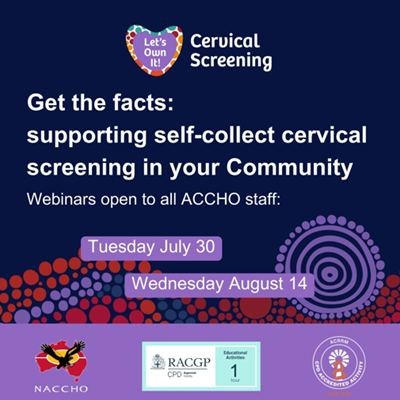

COVID-19 Primary Care Support Program – Expression of Interest Now Open!
WA Primary Health Alliance (WAPHA) has a new funding model to assist COVID-19 vaccination providers and expressions of interest have just opened online.
The program aims to increase COVID-19 vaccination for vulnerable populations within WA.
This program will offer immunisers the opportunity to participate in a targeted program to support vulnerable people who are unable to receive a vaccination through usual channels. This could include housebound individuals or those facing significant challenges in attending vaccination centres or practices during routine business hours.
Vulnerable populations in Australia are often disadvantaged when it comes to accessing vaccines and attending a general practice.
For further information please go to our COVID-19 Vaccination & Resources webpage. If you have any queries, please email our COVID-19 Team: gpvaccination@wapha.org.au
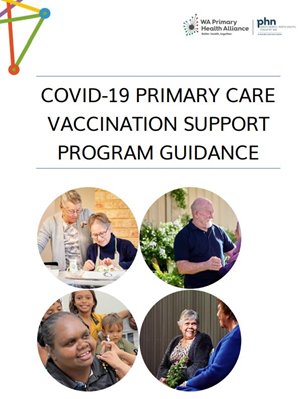
Residential Aged Care Home (RACH) funding for COVID-19 Immunisations
Older age continues to be the biggest risk factor for severe COVID-19 illness or death.
Vaccination is the best way to protect older people from severe illness, hospitalisation or death from COVID-19.
- People aged 75 years and older are recommended a COVID-19 vaccination every 6 months.
- People aged 65 to 74 years are recommended a COVID-19 vaccination every 12 months, and can consider a dose every 6 months, based on their individual health needs.
WA Primary Health Alliance, through its COVID-19 Primary Care Support Program, is providing funding to support General Practice’s and Pharmacists ensure that those who have a higher risk of severe illness have access to the vaccination.
Read more about the program.

GP Telehealth Training and Education
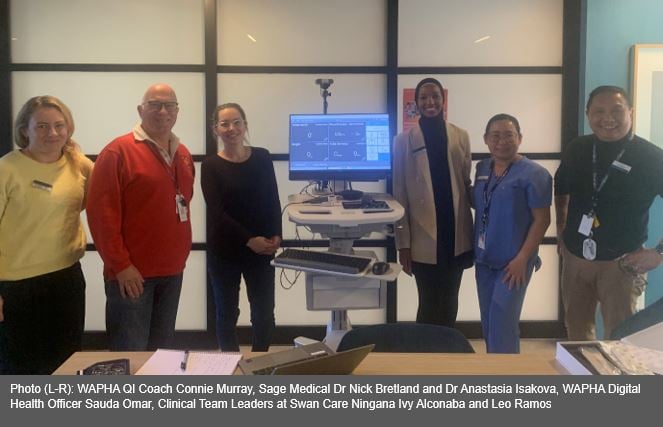
With 180 telehealth medical carts now delivered into residential aged care homes across WA, WA Primary Health Alliance (WAPHA) is offering training support to GPs to learn more about how to interact with the software and more specifically, conduct telehealth video consultation.
“I am amazed as to how much the telehealth cart can do – from auscultation of someone’s lungs to real time video of lesions so you can see things from a few angles. It makes me feel more confident when making judgement calls for patients who might be starting to deteriorate but I cannot get to them that day. I can already think of a few patients that I could have used it for in the past where I wasn’t super sure about a patient’s actual condition. It is highly likely that it might help me sleep better at night knowing the patient will be ok by staying at the RACF. At present, the only other alternative is to send a patient to hospital if the nursing staff are worried and I cannot evaluate the patient to a standard I am happy with, which isn’t ideal.” Dr Anastasia Isakova, Sage Medical Consulting FRACGP, MBBS
The telehealth carts enable GPs who have clients in residential aged care homes to provide better patient care in comparison to more traditional telehealth consults.
All that is required for GPs to engage with their patients via the telehealth carts is a laptop with a camera (or in absence, an iPad, tablet or mobile device). Telehealth appointments can be completed in the comfort of one’s office or home, allocating more time back into your day and/or providing convenience to see patients outside of normal hours.
We welcome you to get in contact for more information or to enquire about training by emailing practiceassist@wapha.org.au or calling 1800 2 ASSIST (1800 2 277 478 or 08 6278 7900).
WAPHA is also providing GPs that complete a training session a certificate of attendance where you can self-log CPD.
For a list of residential aged care homes with the equipment click here.
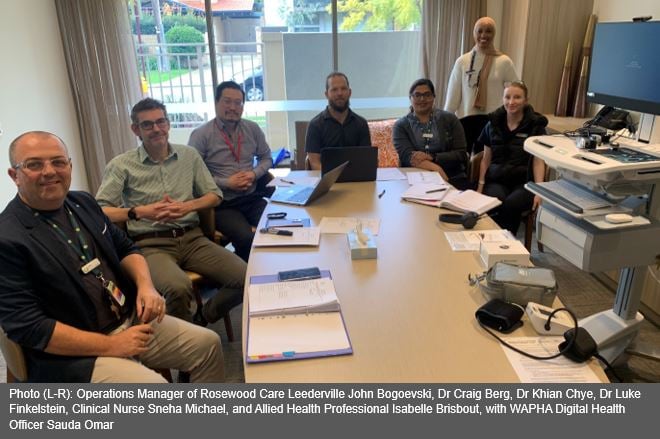
WA Primary Health Alliance’s data linkage pilot to better understand the needs of GPs and their chronic heart failure patients’
We know that health data linkage helps us better understand the patient journey across different parts of the health care system and supports us to commission the right kind of services for GPs and their patients, where they are needed the most. But health service data in WA is not currently linked across the primary care and hospital sectors.
As the operator of WA’s three Primary Health Networks (PHNs), WA Primary Health Alliance (WAPHA) is working to develop a timely, automated, and scalable data linkage solution that encompasses the WA health sector and that can be replicated across other PHNs nationally through the secure, PHN-owned, Primary Health Insights data platform.
The pilot project will utilise the de-identified data already collected by Primary Sense, to differentiate healthcare pathways between patients managed within the practices participating in our Chronic Heart Failure (CHF) intervention and those managed in non-CHF intervention practices.
Using Privacy Preserving Record Linkage technology, WAPHA will be working with the Curtin Centre for Data Linkage and WA Health Data Linkage Unit to develop a proof-of-concept data linkage model to assess the impacts of this CHF intervention on hospital activity, health system cost savings and all-cause mortality.
This process will be governed by your existing Primary Sense DSA, ensuring data is governed responsibly, privacy protected and securely stored and managed in Australia by the PHN-owned Primary Health Insights platform. Patient identifiers are irreversibly encoded and encrypted, and WAPHA will not receive identifying information of individuals or practices as a result of any data linkage methods.
WAPHA will soon be contacting all Primary Sense practices to provide more detailed information on the use of Primary Sense data for this research project and ensure practices are aware on how to withdraw from participating in sharing their data prior to project commencement.
More information on data linkage is available here and practices are encouraged to email WAPHA Analytics and Insights Manager, Dr Christina Read with further questions christina.read@wapha.org.au.

Have your say on the barriers and enablers to supporting children with weight related health concerns in primary health care
WA Primary Health Alliance is seeking GPs and their clinical teams to participate in interviews to give insight into the attitudes, barriers and enablers to supporting children with weight related health concerns. This consultation will inform current gaps in resources to support children in primary health care. We are looking to interview general practice staff from the following fields:
- General practitioners
- Practice nurses
- Dietitians
- Exercise physiologists
- Psychologists
In 2022, WAPHA launched the SHAPE website and Conversations about Weight modules to support health care professionals to play a more central role in supporting patients with weight concerns. To build this, we will be developing additional tools and resources to assist the delivery of accessible, patient-centred weight management care to support children and their families.
Interviews can be conducted in person at your practice or virtually, and will take a maximum of one hour. A participation payment of $120 per interview for GPs and $90 for allied health staff and practice nurses is offered for your time.
Register your interest to participate in this research by contacting Andrea Vermeersch, Healthy Weight Program Coordinator, WA Primary Health Alliance Andrea.Vermeersch@wapha.org.au
Interviews will begin the week commencing 29 July 2024.
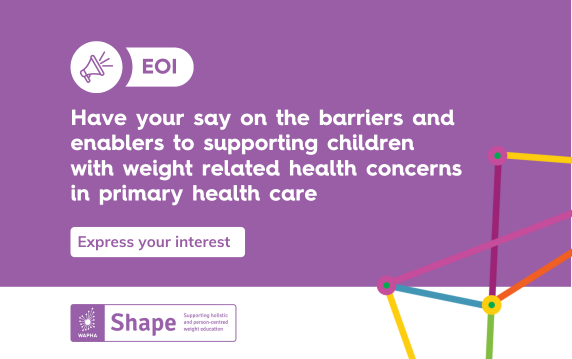
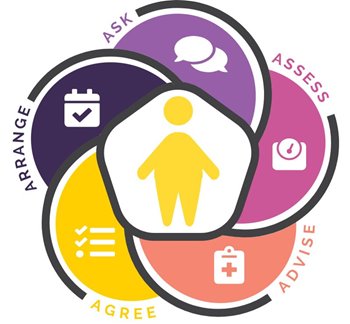

Red Nose Day Friday 9 August 2024
Help celebrate the 36th annual Red Nose Day. Register a fundraiser, buy merchandise or donate to help save little lives, support grieving families and fund ground-breaking research.
About Red Nose Day
Funds raised on Red Nose Day over the last 36 years have resulted in an incredible 80 per cent reduction in sudden infant deaths. That’s 12,069 babies saved and counting.
Red Nose Day sparked a global movement and catalysed research into the reasons why babies die suddenly in their sleep.
And because of that, we now have six evidence-based steps all parents can take to reduce the risk of their baby dying in their sleep.
None of this would have been possible without the incredible public support for Red Nose Day.
Visit the Red Nose Day website to get involved.


Webinar: Immunisation in Pregnancy and Adults
Presented by WA Primary Health Alliance
29 August 2024 (5pm to 6pm AWST)
Vaccination during pregnancy does not only protect the mother but also generates antibodies that can cross the placenta, providing protection to the unborn baby.
Immunisations are even more important as we age. Our immune system begins to decline in its ability to fight off infections, which makes people ages over 65 (Aboriginal people over 55) and older more vulnerable to diseases like influenza, COVID-19, pneumonia, and shingles.
Topics included in this webinar:
- Understanding the immunisation schedule for pregnant people and adults
- Gain an understanding of immunisation before and during pregnancy
- Gain an understanding of immunisation for adults
- Accessing AIR reports and using appropriate calculation tools to better care for adults.
Find out more and register today.
Paid GP online training: IAR-DST to guide mental health referrals – July training dates
Presented by WA Primary Health Alliance
Multiple Dates & Times
WA Primary Health Alliance (WAPHA) is providing GPs in WA with paid online Initial Assessment and Referral Decision Support Tool (IAR-DST) training, designed to help practitioners and clinicians recommend the most appropriate level of care for a person seeking mental health support.
GPs and GP registrars who attend the two workshops in the one online session will be remunerated $300 and CPD hours are available.
MyMedicare and the General Practice in Aged Care Incentive – Webinar for Aged Care Providers, Residents and Families/Carers
Presented by Department of Health and Aged Care
6 August 2024 (12pm AWST)
Audience: Residential Aged Care Homes, Aged Care Providers, residents and their families and carers
The Department of Health and Aged Care is hosting a webinar for Residential Aged Care Homes, Aged Care Providers, residents and their families and carers.
The webinar will outline how the new General Practice in Aged Care Incentive aims to improve access to general practice care and benefits for aged care providers and residents.
Speakers include:
- Craig Gear, Chief Executive Officer, Older Persons Advocacy Network (OPAN)
- Mark Roddam, First Assistant Secretary, Primary Care Division, Department of Health and Aged Care
- Clare Sullivan, Acting Assistant Secretary, Primary Care Delivery Branch, Department of Health and Aged Care, and
- Dr Paresh Dawda, Specialist, Prestantia Health.
If you belong to one of the intended audience categories listed above and would like to register for the webinar, please click here.
Free GP online training sessions – depression management and suicide prevention
Presented by Black Dog Institute
Multiple Dates & Times
Please make your GPs and GP registrars aware that they can attend free online training sessions throughout the 2024 calendar year with a choice of target topics including:
- Talking About Suicide in General Practice
- Dealing with Depression
- Dealing with Depression in Rural Australia
- Advanced Training in Suicide Prevention
CPD hours are available for the online training sessions.
For more information, dates and registration links, visit WAPHA’s suicide prevention webpage.
Free Chronic Conditions of the Foot Workshop
Presented by Benchmarque Group
13 September 2024 (9am to 4:30pm, Rockingham)
The Chronic Conditions of the Foot workshop will focus on building a practical skillset for foot assessment that enables a healthcare practitioner to be competent and confident in chronic conditions of the foot basic care.
This workshop is supported by funding from the Australian Government Department of Health under the Chronic Disease Support Project.
For more information, view the flyer.
Other Webinars, Events & Workshops
| Creating a Health Vision for Autistic Individuals Presented by Autism Association of WA and funded by the State Government through the Department of Communities Multiple Dates |
| Better Health Program – Term 3 Program Now Available! Presented by Better Health Program Multiple Dates |
| The Active8 – Term 3 Program Now Available! Presented by The Active8 Multiple Dates |
| Intimate Partner Violence and Reproductive Coercion and Abuse eLearning Presented by SHQ Online training |
| BreastScreen WA visit to Collie Presented by BreastScreen WA 11 July to 29 August |
| STARS Presented by SHQ 24 July to 25 July |
| GP Pain Seminar Presented by Royal Perth Bentley Group 25 July |
| Our Woven Ways: Supporting goal setting with Aboriginal and Torres Strait Islander parents Presented by Emerging Minds 25 July |
| A United Front: Working Together to Prevent Congenital Syphilis Presented by ASHM 31 July |
| BreastScreen WA visit to Moora Presented by BreastScreen WA 2 August to 22 August |
| eMHPrac Webinar: eCBT for Adolescents with Depressive Symptoms Presented by Black Dog Institute 8 August |
| Aboriginal Health Conference 2024 Presented by Rural Health West 10 August & 11 August |
| WA Sexual and Reproductive Health in Primary Care Presented by ASHM 10 August to 17 August |
| Certificate in Sexual and Reproductive Health (Nursing) Presented by SHQ 20 August to 23 August |
| Contraceptive Implant Theory Workshop Presented by SHQ 21 August |
| AAPM Educare | Perth Series Presented by AAPM 22 August |
| Cervical Screening Training Presented by SHQ 22 August to 23 August |
| WA Culturally Responsive Care and Hepatitis B Presented by ASHM 22 August |
| RACGP Early Career GP Conference Presented by RACGP 24 August & 25 August |
| Essentials of Medical Abortion in Western Australia – Live Webinar Presented by SHQ 27 August |
| BreastScreen WA visit to Cottesloe Presented by BreastScreen WA 27 August to 3 September |
| BreastScreen WA visit to West Lamington (Kalgoorlie) Presented by BreastScreen WA 28 August to 25 September |
| BreastScreen WA visit to Booragoon Presented by BreastScreen WA 4 September to 20 September |
| De-escalation Skills NEW half day (face-to-face) Presented by WAAMH 30 September |
| Chronic Disease Care Planning Presented by Benchmarque Group 11 October |

